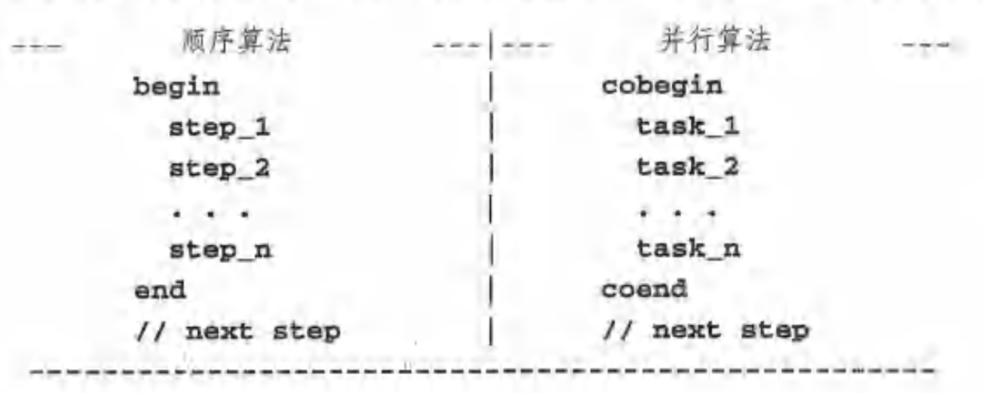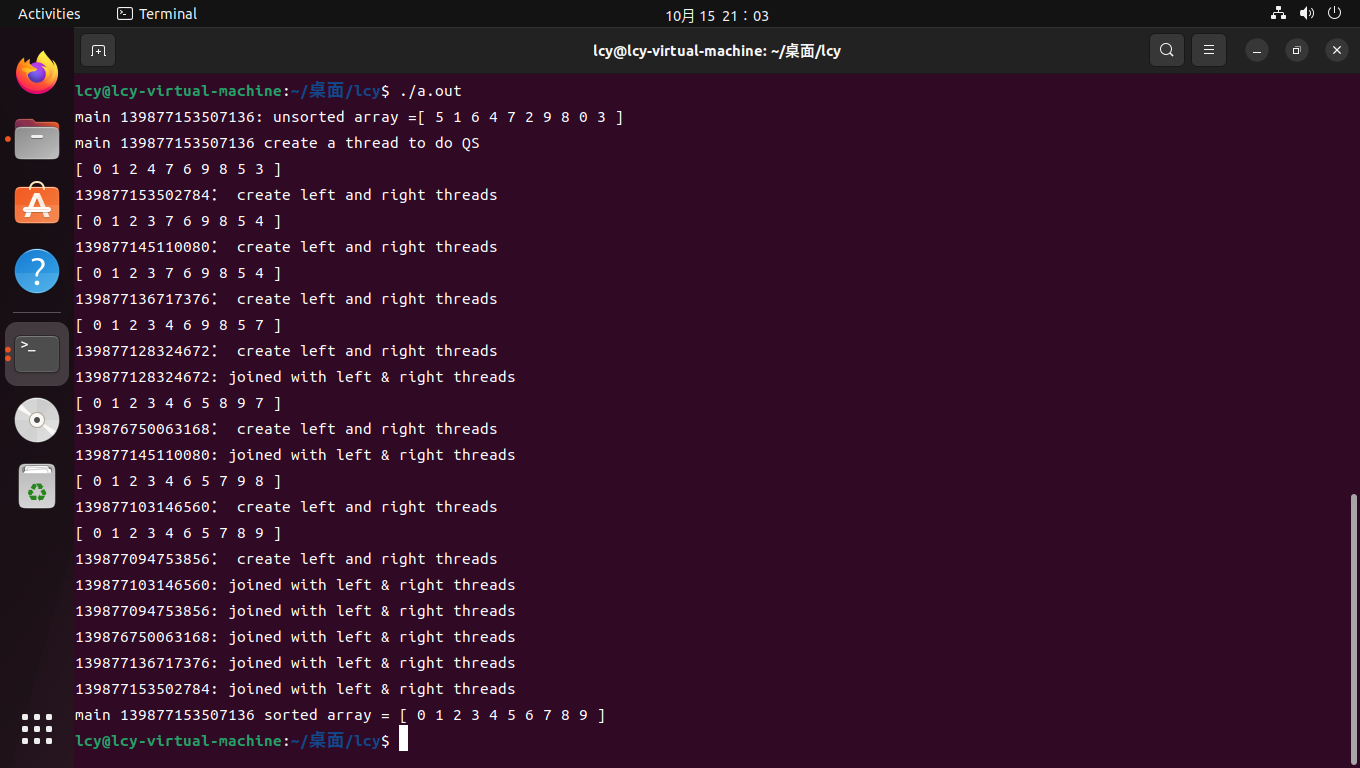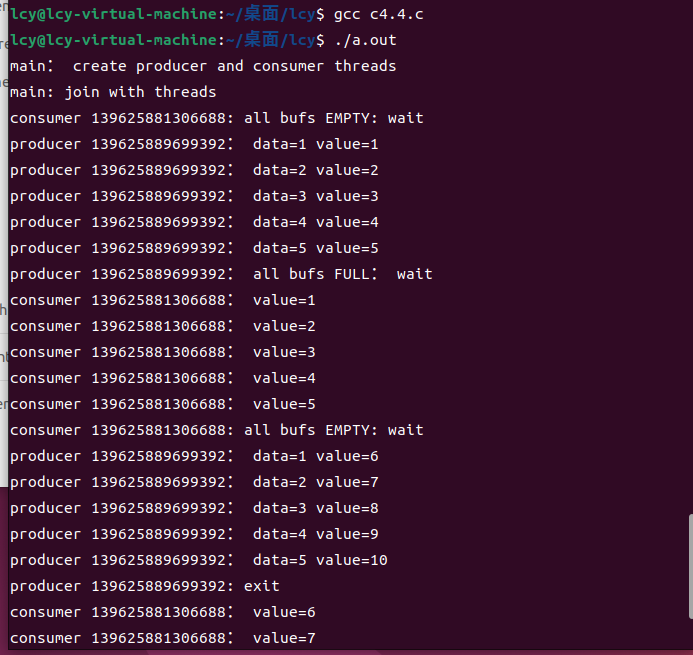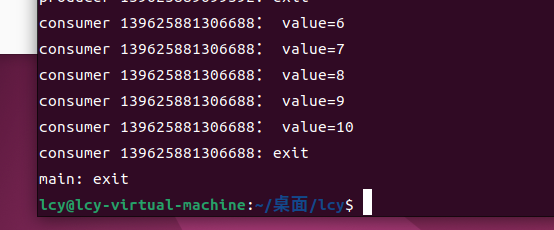第四章学习笔记
第四章 并发编程
一、知识点归纳
4.1 并行计算导论
4.1.1 顺序算法与并行算法
在描述顺序算法中,常用一个begin-end代码块列出算法。

- begin-end代码块中的顺序算法可能包含多个步骤,所有步骤都是通过某个任务依次执行的。
- cobegin-coend代码块指定并行算法的独立任,所有任务都是并行执行的。
4.1.2 并行性与并发性
在理想情况下,并行算法中的所有任务都应该同时实时执行。
4.2 线程
4.2.1 线程的原理
在进程模型中,进程是独立的执行单元。所有进程均在内核模式或用户模式下执行。在内核模式下,各进程在唯一地址空间上执行,与其他进程是分开的。虽然每个进程都是一个独立的单元,但是它只有一个执行路径。
4.2.2 线程的优点
与进程相比,线程有许多优点:
- 线程创建和切换速度更快
- 线程的响应速度更快
- 线程更适合并行计算
4.2.3 线程的缺点
另一方面,线程也有一些缺点,其中包括:
- 由于地址空间共享,线程需要来自用户的明确同步。
- 许多库函数可能对线程不安全,例如传统 strtok()函数将一个字符串分成一连串令牌。通常,任何使用全局变量或依赖于静态内存内容的函数,线程都不安全。为了使库函数适应线程环境,还需要做大量的工作。
- 在单CPU系统上,使用线程解决问题实际上要比使用顺序程序慢,这是由在运行时创建线程和切换上下文的系统开销造成的。
4.3 线程操作
线程操作的执行轨迹与进程类似。线程可在内核模式或用户模式下执行。在用户模式下,线程在进程的相同地址空间中执行,但每个线程都有自己的执行堆栈。线程是独立的执行单元,可根据操作系统内核的调度策略,对内核进行系统调用,变为挂起、激活以继续执行等。
4.4 线程管理函数
4.4.1 创建线程
int pthread_create(pthread_t *thread_id,pthread_attr_t *attr,void *(*func)(void*), void *arg);
4.4.2 线程ID
线程ID是一种不透明的数据类型,取决于实现情况。因此,不应该直接比较线程ID。如果需要,可以使用pthread_equal()函数对它们进行比较。
int pthread_equal(pthread_t t1,pthread_t t2);
如果是不同的线程,则返回0,否则返回非0
4.4.3 线程终止
线程函数结束后,线程即终止。或者,线程可以调用函数
void pthread_exit(void *status);
进行显式终止,其中状态是线程的退出状态。通常,0退出值表示正常终止,非0值表示异常终止
4.4.4 线程连接
一个线程可以等待另一个线程的终止,通过:
int pthread_join (pthread_t thread, void **status ptr);
终止线程的退出状态以status_ptr返回。
4.5 线程同步
4.5.1 互斥量
最简单的同步工具是锁,它允许执行实体仅在有锁的情况下才能继续执行。在Pthread中,锁被称为互斥量,意思是相互排斥。互斥变量是用pthread_mutex_t类型声明的,在使用之前必须对他们进行初始化,有两种方法可以初始化互斥量。
- 静态方法:定义互斥变量m,并使用默认属性对其进行初始化。
pthreaa_mutex_t m = PTHREAD_MUTEX_INITIALIZER;
- 动态方法:使用pthread_ mutex _init()函数,可通过attr参数设置互斥属性,如:
pthread_mutex_init(pthread_mutex_t *m,pthread_mutexattr_t,*attr);
4.5.2 死锁预防
死锁是一种状态,在这种状态下,许多执行实体相互等待,因此都无法继续下去,一种简单的死锁预防是对互斥量进行排序,并确保每个线程只在一个方向请求互斥量,这样请求序列中就不会有循环。
4.5.3 条件变量
条件变量提供了一种线程协作的方法,首先获取相关的互斥量。然后,它在互斥量的临界区内执行操作,然后释放互斥量。
4.5.4 信号量
信号量是进程同步的一般机制,也是一种数据结构
struct sem{
int value;
struct process *queue
}s;
二、实践操作
1 用线程计算矩阵的和
/**** C4.l.c files compute matrix sum by threads****/
#include <stdio.h>
#include <stdlib.h>
#include <pthread.h>
#define N 4
int A[N][N], sum[N];
void *func(void *arg)
{
int j, row;
pthread_t tid = pthread_self(); // get thread ID number
row = (int)arg; // get row number from arg
printf("Thread %d [%lu] computes sum of row %d\n", row, tid, row);
for (j=0; j<N; j++)
{
sum[row] += A[row][j];
}
printf("Thread %d [%lu] done锟斤拷 sum[%d] = %d\n",row, tid, row, sum[row]);
pthread_exit((void*)0); // thread exit: 0=normal termination
}
int main (int argc, char *argv[])
{
pthread_t thread[N]; // thread IDs
int i, j, r, total = 0;
void *status;
printf("Main: initialize A matrix\n",N);
for (i=0; i<N; i++)
{
sum[i] = 0;
for (j=0; j<N; j++)
{
A[i][j] = i*N + j + 1;
printf("%4d" ,A[i][j]);
}
printf("\n");
}
printf("Main: create %d threads\n", N);
for(i=0; i<N; i++)
{
pthread_create(&thread[i], NULL, func, (void *)i);
}
printf("Main: try to join with threads\n");
for(i=0; i<N; i++)
{
pthread_join(thread[i], &status);
printf("Main: joined with %d [%lu]: status=%d\n",i, thread[i], (int)status);
}
printf("Main: compute and print total sum:");
for (i=0; i<N; i++)
{
total += sum[i];
}
printf("tatal = %d\n", total);
pthread_exit(NULL);
}

2 用并发线程快速排序
/****** C4.2.c: quicksort by threads *****/
#include <stdio.h>
#include <stdlib.h>
#include <pthread.h>
#define N 10
typedef struct{
int upperbound;
int lowerbound;
}PARM;
int A[N]={5,1,6,4,7,2,9,8,0,3};
int print() // print current a[] contents
{
int i;
printf("[ ");
for (i=0; i<N; i++)
{
printf("%d ", A[i]);
}
printf("]\n");
}
void *qsort_1(void *aptr)
{
PARM *ap, aleft, aright;
int pivot, pivotIndex, left, right, temp;
int upperbound, lowerbound;
pthread_t me, leftThread, rightThread;
me = pthread_self();
ap = (PARM *)aptr;
upperbound = ap->upperbound;
lowerbound = ap->lowerbound;
pivot = A[upperbound];
left = lowerbound - 1;
right = upperbound;
if (lowerbound >= upperbound)
pthread_exit(NULL);
while (left < right)
{
do { left++;} while (A[left] < pivot);
do { right--;}while (A[right] > pivot);
if (left < right )
{
temp = A[left];
A[left] = A[right];
A[right] = temp;
}
}
print();
pivotIndex = left;
temp = A[pivotIndex];
A[pivotIndex] = pivot;
A[upperbound] = temp; // start the "recursive threads"
aleft.upperbound = pivotIndex - 1;
aleft.lowerbound = lowerbound;
aright.upperbound = upperbound;
aright.lowerbound = pivotIndex + 1;
printf("%lu: create left and right threads\n", me);
pthread_create(&leftThread, NULL, qsort_1, (void *)&aleft);
pthread_create(&rightThread, NULL, qsort_1, (void *)&aright);// wait for left and right threads
pthread_join(leftThread, NULL);
pthread_join(rightThread, NULL);
printf("%lu: joined with left & right threads\n", me);
}
int main(int argc, char *argv[])
{
PARM arg;
int i, *array;
pthread_t me, thread;
me = pthread_self();
printf("main %lu: unsorted array =" ,me);
print();
arg.upperbound = N-1;
arg.lowerbound = 0;
printf("main %lu create a thread to do QS\n", me);
pthread_create(&thread, NULL, qsort_1, (void *)&arg); // wait for QS thread to finish
pthread_join(thread, NULL);
printf("main %lu sorted array = ", me);
print();
}

3 示例1的修改版,将部分和添加到全局变量中
/** C4.3.c: matrix sum by threads with mutex lock **/
#include <stdio.h>
#include <stdlib.h>
#include <pthread.h>
#define N 4
int A[N][N];
int total = 0;
pthread_mutex_t *m;
void *func(void *arg)
{
int i, row, sum = 0;
pthread_t tid = pthread_self(); // get thread ID number
row = (int)arg; // get row number from arg
printf("Thread %d [%lu] computes sum of row %d\n", row, tid, row);
for (i=0; i<N; i++)
sum += A[row][i];
printf("Thread %d [%lu] update total with %d : Thread %d : ", row, tid, sum,row);
//pthread_mutx_lock(m);
pthread_mutex_lock(m);
total += sum;
pthread_mutex_unlock(m);
printf ("total = %d\n", total);
}
int main (int argc, char *argv[])
{
pthread_t thread[N];
int i, j, r;
void *status;
printf("Main: initialize A matrix\n");
for (i=0; i<N; i++)
{
//sum[i] = 0;
for (j=0; j<N; j++)
{
A[i][j] = i*N + j + 1;
printf("%4d ", A[i][j]);
}
printf("\n");
}
// create a mutex m
m = (pthread_mutex_t *)malloc(sizeof(pthread_mutex_t));
pthread_mutex_init(m, NULL); // initialize mutex m
printf("Main: create %d threads\n", N);
for(i=0; i<N; i++)
{
pthread_create(&thread[i], NULL, func, (void *)i);
}
printf("Main: try to join with threads\n");
for(i=0; i<N; i++)
{
pthread_join(thread[1], &status);
printf("Main: joined with %d [%lu]: status=%d\n",i, thread[i]/ (int)status);
}
printf("Main: tatal = %d\n", total);
pthread_mutex_destroy (m); // destroy mutex m
pthread_exit(NULL);
}

4 生产者——消费者问题
/* C4.4 .c: producer-consximer by threads with condition variables */
#include <stdio.h>
#include <stdlib.h>
#include <pthread.h>
#define NBUF 5
#define N 10
// shared global variables
int buf[NBUF]; // circular buffers
int head, tail; // indices
int data; // number of full buffers
pthread_mutex_t mutex;
pthread_cond_t empty, full;
int init()
{
head = tail = data = 0;
pthread_mutex_init(&mutex, NULL);
pthread_cond_init(&full, NULL);
pthread_cond_init(&empty, NULL);
}
void *producer()
{
int i;
pthread_t me = pthread_self();
for (i=0; i<N; i++) // try to put N items into buf[]
{
pthread_mutex_lock(&mutex); // lock mutex
if (data == NBUF)
{
printf ("producer %lu: all bufs FULL: wait\n", me);
pthread_cond_wait(&empty, &mutex); // wait
}
buf[head++] = i+1;
head %= NBUF;
data++;
printf("producer %lu: data=%d value=%d\n", me, data, i+1);
pthread_mutex_unlock (&mutex);
pthread_cond_signal(&full);
}
printf("producer %lu: exit\n", me);
}
void *consumer()
{
int i, c;
pthread_t me = pthread_self();
for (i=0; i<N; i++)
{
pthread_mutex_lock(&mutex); // lock mutex
if (data == 0)
{
printf ("consumer %lu: all bufs EMPTY: wait\n", me);
pthread_cond_wait(&full, &mutex); // wait
}
c = buf[tail++]; // get an item
tail %= NBUF;
data--; // dec data by 1
printf("consumer %lu: value=%d\n", me, c);
pthread_mutex_unlock(&mutex); // unlock mutex
pthread_cond_signal(&empty); // unblock a producer, if any
}
printf("consumer %lu: exit\n", me);
}
int main ()
{
pthread_t pro, con;
init();
printf("main: create producer and consumer threads\n");
pthread_create(&pro, NULL, producer, NULL);
pthread_create(&con, NULL, consumer, NULL);
printf("main: join with threads\n");
pthread_join(pro, NULL);
pthread_join(con, NULL);
printf("main: exit\n");
}


三、本周总结
本章论述了并发编程,介绍了并行计算的概念,指出了并行计算的重要性;比较了顺序算法与并行算法,以及并行性与并发性;解释了线程的原理及其相对于进程的优势;也通过具体示例演示了如何使用线程进行并发编程,包括矩阵计算、快速排序等方式。




 浙公网安备 33010602011771号
浙公网安备 33010602011771号